Sports Physiotherapy
Sports Physiotherapy, or Sports Physio, is the specialised branch of physiotherapy that deals with injuries and issues related to sports people.
Sports injuries differ to everyday injuries. Athletes require a high level of performance that places extra demands upon their body, which can push their muscles, joints and bones to the limit. Sports physiotherapists help athletes recover from sporting injuries and provide education and resources to prevent problems.
Our sports physiotherapists have sport-specific knowledge that addresses acute, chronic and overuse injuries. Their services are available to sports men and women of all ages, engaged in sports at any level of competition.
Our clinic provides an excellent environment for education in injury prevention and rehabilitation following any injury sustained while taking part in sporting activities.
We have experience and knowledge of the latest evidence-based practice, and skilled assessment and diagnosis of sports injuries. We use effective 'hands-on' management techniques and exercise protocols to assist recovery and prevent injury.
Pitch Side Physiotherapy
In our clinics we have many years of experience in the provision of pitch side physiotherapy for a variety of sports teams, including hurling, football, rugby and hockey.
We are highly experienced in pre match strapping and treatments, and the provision of First Aid during matches. Direct assessments and treatment of acute injuries after matches leads to a faster recovery time for the players. We have completed regular specialised training in first aid to ensure that we are up to date in all the latest techniques.
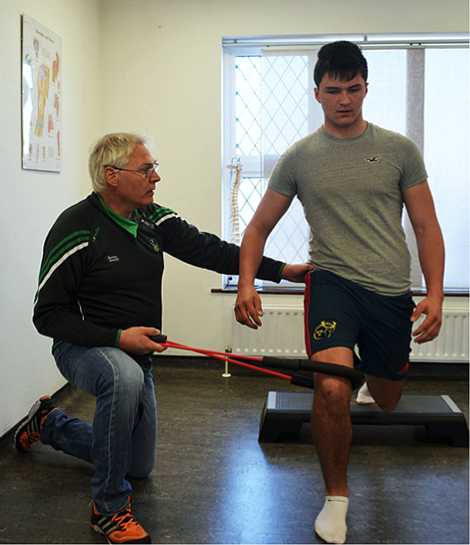
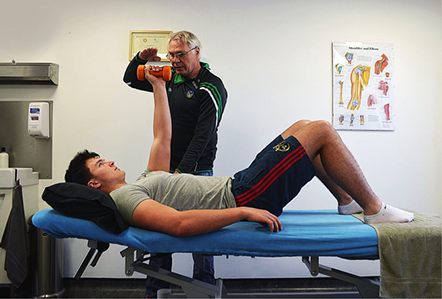
Physiotherapy Rehab and Treatment for Sports Injuries
Our rehabilitation programs are designed to help athletes to progress to their full potential as soon as possible, by improving their strength, coordination, balance, endurance and specific sport skills.
- Knee (ACL, meniscus tear, tendonitis, articular cartilage)
- Shoulder (rotator cuff, shoulder labral tear, shoulder instability)
- Elbow (lateral epicondylitis, known as “tennis elbow,” medial epicondylitis, known as “golfer’s elbow”, biceps tendon tears, ligament tears
- Ankle (ankle instability, ankle cartilage or OCD lesions)
- Functional Movement Screening (FMS)
After assessment your rehabilitation program may include:
- Manual therapy (including massage)
- Sport rehabilitation
- Electrotherapy
- Sport specific training to reach full potential
- Muscle energy techniques (using your muscle contractions to reposition misaligned joints)
- Joint and soft tissue mobilisation
- Prescription exercise
- Therapeutic exercises targeted at weak or tight areas
- Posture, body mechanics and ergonomic instruction
- Team sports packages, including pre-season and post-season testing and injury-prevention programs
Exercise Therapy
Physiotherapists know that the key to a successful recovery is not only reducing pain, improving movement or accelerating healing, but it is also important to regain muscle strength, to improve joint awareness and balance skills. All these features of the human body we take for granted are often affected by injury or pain.
When our body is in pain, be it through injury or illness, it can change the way that our muscles behave. It often makes them weaker, tighter or de-conditioned.
Physiotherapists are trained to identify which muscles have been affected by your condition. As part of your treatment plan, they may include specific exercises for you to undertake to help regain strength, flexibility and condition to the muscle, and the joints it supports. A continued home exercise programme will be prescribed as part of your treatment.
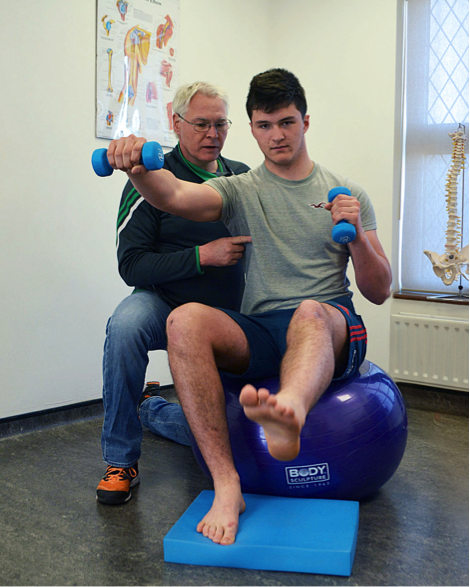
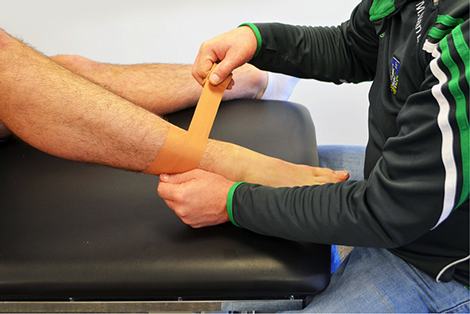
Strapping & Dynamic Taping
We offer pre-match strapping to minimize the risk of injuries. Strapping and taping are important for athletes in injury prevention, and can be extremely beneficial in facilitating an early return to sporting activities following an injury. Mark has been involved with sports teams since his arrival in Limerick 20 years ago, and has been successfully utilising strapping on a daily basis to facilitate an earlier return to sport as part of the overall rehabilitation.
All patients would be assessed prior to any treatment being prescribed, and it is likely that taping may be prescribed in conjunction with other treatment options.
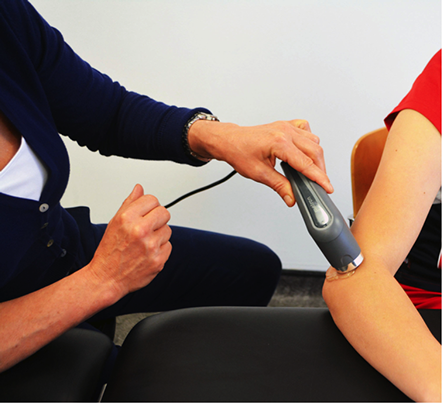
Electrotherapy
Electrotherapy encompasses a variety of different modalities that physiotherapists can use to help manage pain relief, accelerate healing or reduce the formation of scar tissue. Treatment is usually given using equipment that uses electrical energy to change pain signals or alter tissue healing. These usually include Ultrasound (US), neuromuscular electrostimulation (NMES), and interferential (IF) treatment.
If your therapist feels that this equipment is appropriate for you, then they will explain how the equipment works and what you should expect to feel prior to commencing treatment. There are some conditions in which it is advisable not to use these machines, so please inform your therapist when you start treatment if you are pregnant, have metal joint replacements or a pacemaker.